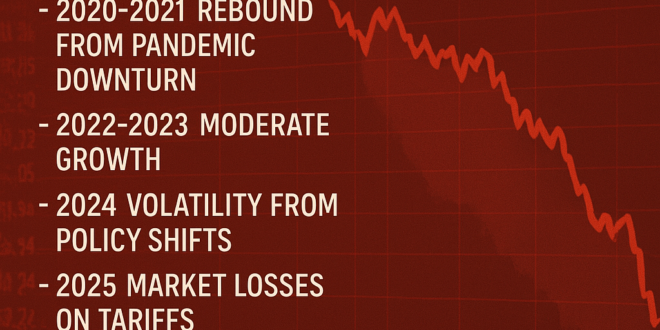The recent implementation of sweeping tariffs by the U.S. administration has led to significant turmoil in the stock market, with the S&P 500 experiencing a sharp decline of 4.9%, the Nasdaq dropping 6%, and the Dow Jones Industrial Average falling nearly 1,700 points.
This downturn has resulted in a substantial loss of market capitalization, echoing the market’s vulnerability to trade policy shifts.
Five-Year Retrospective of the U.S. Stock Market (2020-2025)
Over the past five years, the U.S. stock market has navigated a series of economic events:
2020-2021:The market rebounded from the COVID-19 pandemic-induced downturn, driven by technological innovation and supportive monetary policies.
2022-2023:Moderate growth characterized these years, with sectors like technology and healthcare leading gains amid global economic recovery.
2024: The market faced volatility due to anticipations of policy changes, including discussions on trade tariffs and fiscal adjustments.
2025: The introduction of new tariffs has led to significant market losses, with major indices reaching their lowest levels since late 2024.
Implications for Other Tariff-Imposing Nations
The U.S.’s recent tariff actions have several implications for other countries considering similar measures:
1. Economic Retaliation:
Major trading partners, such as China and the European Union, have responded with their own tariffs, escalating trade tensions and potentially leading to a cycle of retaliatory measures.
2. Market Volatility:
The imposition of tariffs has contributed to increased market volatility, with significant declines in major indices reflecting investor concerns over the potential for a global recession.
3. Sectoral Impacts:
Industries heavily reliant on international supply chains, such as technology and manufacturing, may experience disruptions, affecting global production and profitability.
4. Global Economic Growth:
The escalation of trade barriers can dampen global economic growth by disrupting trade flows, increasing costs for consumers and businesses, and creating uncertainty that hinders investment.
In summary, while tariffs are often employed to protect domestic industries, their broader economic implications—such as market instability, retaliatory measures, and potential recessionary pressures—highlight the need for careful consideration and international cooperation in trade policy decisions.
 Top Trends Blogs
Top Trends Blogs




